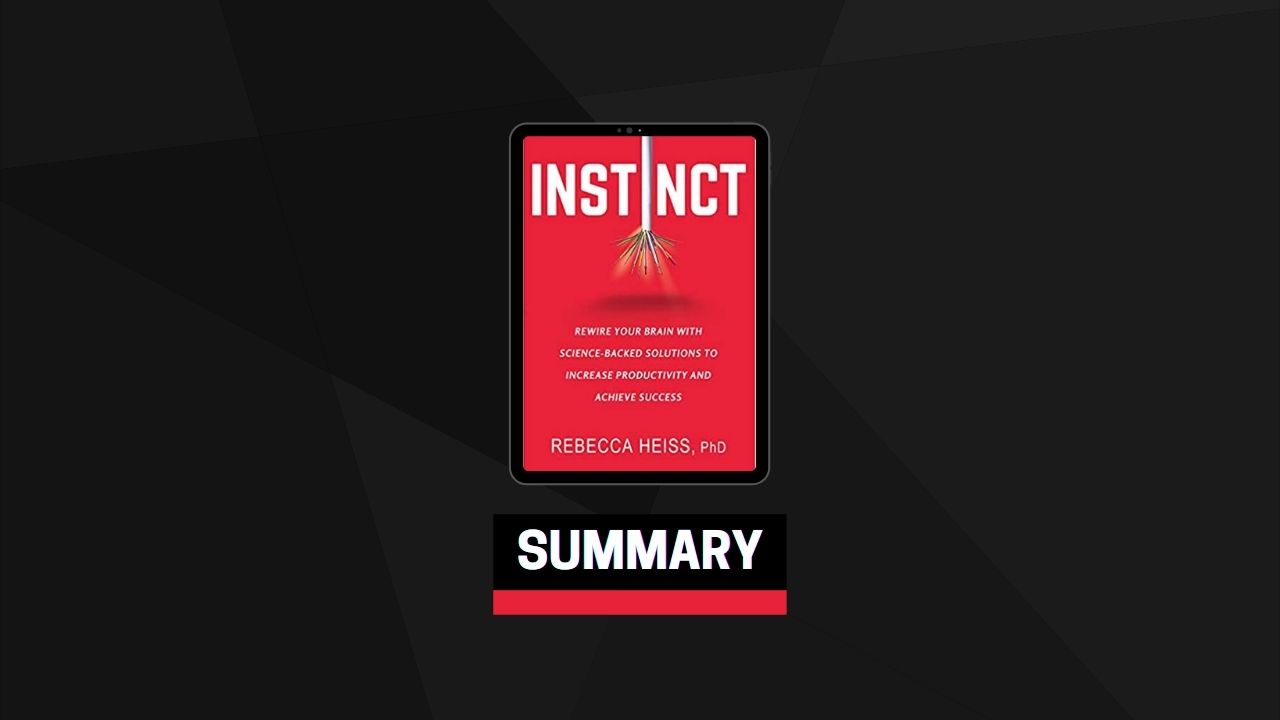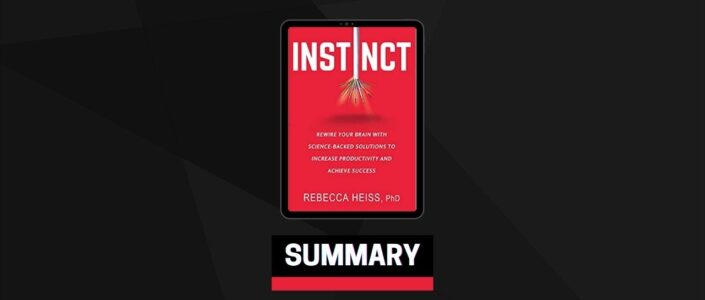Survival
Your survival instinct is at the root of all other instincts.
In the ancestral environment, our survival instinct kept us safe from life-threatening scenarios, but in a modern world it causes us undue stress on our brains, bodies, relationships, and work performance.
Find ways to engage in festina lente: Make haste slowly to reduce stress and optimize productivity.
Batch tasks to ensure time for deep work.
Set awareness alarms for a conscious check-in.
Seek novelty to bend time and experience life more slowly.
Keep a gratitude journal to help overcome negativity bias.
Use your conscious power to interpret the signal of stress as an adventure rather than an ordeal.
Sex
Recognize how your own “hot” or “cold” emotional states might be affecting your decisions, or the decisions of others.
Ask people you trust to challenge you whenever they hear you use gendered language.
Take an Implicit Association Test to become more consciously aware of the subconscious associations you might have around gender (or other biases!): www.implicit.harvard.edu/implicit/taketest.html.
Intentionally read books and listen to podcasts by women to challenge your perception and definition of leadership.
Actively seek out parenting and housekeeping books and podcasts authored by men.
Identify ways you might be misinterpreting sexual cues.
Use gender-masking tools to limit gender bias throughout the hiring process.
Find and use brag buddies.
Be willing to intervene if you see a situation that might be sexual harassment.
Review your company’s sexual harassment policies to ensure they contain language about the freeze response.
When in pursuit of a sexual partner, recognize that a smile does not imply consent. Understand the freeze response and give time and space for the other person to come back to you.
If you’ve experienced the freeze response, recognize that your biology was trying to protect you. Release yourself from any blame you may have carried for not doing more in that moment.
Variety
Check your assumption that more is always better.
Cut or limit your choices by establishing constraints and enacting deadlines.
Recognize that we don’t always live in an immediate return environment. Be willing to delay gratification for a better return at a slightly later time.
Make the “right” choice now, for a better payoff later.
Lust after what you already have.
Define your acceptability threshold and don’t kiss any more frogs than you need to!
Go all-in; make decisions irreversible.
Self-Deception
Celebrate non-experts (including yourself).
Challenge the perception of your own rules being the only, or right, or best set.
Explore ways to use the powerful placebo effect for positive changes.
Use actions to drive new beliefs.
Seek crowdsourcing to solve “expert” problems.
Understand not just your proximate reason for a behavior, but the ultimate reason that drives it.
Stop using “but.” Try “Yes, and . . .” to carry the conversation forward.
Adapt shoshin and ask “why?” a lot.
Belonging
Use Minimal Group Paradigm to help establish positive alliances throughout your organization.
Remember that “winning” doesn’t mean someone else has to lose. This isn’t a zero sum game.
Create family-like atmospheres by establishing traditions.
Focus externally on a common enemy.
Be vulnerable enough to admit you may have been wrong.
Establish a sense of family with reciprocal renewal.
Model crowlike behaviors.
Fear of the Other
Be willing to be the fire or disruptor. Challenge ideas and rules that have taken root in your organization.
Seek opportunities to eliminate barriers for the non-dominant “species” of your organization. How can everyone have equal voices and access to resources?
Be willing to engage in the difficult conversations. Ask others to assume positive intent on your behalf and assume positive intent of others.
Check your tailwinds. How might others be experiencing an event differently than you?
Proactively seek opportunities to spend time with those who are different from you.
Use bias elimination tools to remove unconscious bias from your hiring practices.
Get comfortable with discomfort with fear(less) challenges.
Information Gathering
Be willing to consider information that doesn’t support your perspective.
Double-check that you aren’t falling into the fallacy of correlation implying causation.
Keep it simple—“real leaders don’t need clutter.”
Identify your purpose-driven question first and allow it to inform decisions on how data should be applied.
Eliminate FOMO by reframing into JOMO.
Schedule Death Days.
Be curious and set up steel-person arguments rather than associating negative stories to data interpreted differently than your story.
Becoming Fear(less)
We are all making decisions that have the potential to impact the lives of everyone on our teams, in our families, and across our communities. This responsibility can be a daunting weight to carry even in the best of times. But when we have drastic disruptions to our lives, such as those imposed by COVID-19, the burden can become crushing
Now more than ever we need to find ways to pause, think, and then act effectively, responsibly, and empathetically, while avoiding the behavioral pitfalls to which our instincts will direct us. We need to be real about risks without leaping immediately to a panicked, instinctual, full-of-fear response.
Here are the three most common instinct-driven behavioral pitfalls people flounder with during this unprecedented crisis, as well as ways for you to avoid their mistakes.
Fear(full) Response 1: The Short-Term Solver
Under times of extended stress, we naturally limit the options we will consider. Instead of opening our eyes to all possibilities, it’s human nature to put on blinders and return to the rules we know—or at least the rules we think we know.
Our brains actually undergo scientifically demonstrated cognitive impairment (e.g., impaired memory, impaired creativity, impaired decision-making) in times when we need them the most. This is nature’s way of “saving us,” by reducing the tremendous amount of energy our brains would be consuming by thinking. Instead, our biology redirects us to rely solely on instinct. And as you now know, the message our instincts send us is clear: “Survive. Nothing else matters but NOW.”
Instead of quickly solving a problem for the short term, a more fear(less) response would be to flip the narrative and look to the long term. Ask: “What does this problem look like in twelve months?” Fixing an immediate issue in an uncertain environment might mean that tomorrow there is an entirely new issue, or that the issue you “fixed” wasn’t actually an issue at all. By flipping the narrative and keeping a long-term perspective, you can ensure you are more prepared as situations evolve, rather than accepting what feels like a static short-term solution.
Fear(full) Response 2: The Ego-Enhancer
Another instinctual response to uncertainty is to reestablish ourselves as experts and authority figures. No doubt we all appreciate clear information and guidance. But when we are facing unprecedented situations in which some basic questions (How long will this last?) are unanswerable, it is far more damaging to pretend we have the answers when the reality is that we simply aren’t equipped or informed any more than most. It’s essential for us to show up to our families and teams with intention, but also with vulnerability. It’s okay to not have all the answers. In fact, being willing to admit that is often exactly what people need to hear. It exhibits empathy, while allowing you to exemplify the calm emotional stability that’s needed during turbulent times.
We can lead powerfully while expressing our doubt or uncertainty—the greatest leaders do. In fact, times of crisis require humility. Rather than losing trust by passing along information that may be inaccurate, approach issues from the vulnerable position of the non-expert. This shows that you are more likely to seek out credible sources of information. Confident leadership requires sorting what we do and do not know and distilling that message to clear, accurate communications.
We all want to be experts. We all want to remove pains from our teams and especially from those we love. But sometimes, the kindest thing we can do is to be clear. The more comfortable we are with communicating what we don’t know, the more trust we will build and the easier everyone around us can endure the turbulent times.
Fear(full) Response 3: The Hideaway
Uncertainty can paralyze us. In stressful times, when we feel like our thinking is unclear, our instincts signal for us to retreat or freeze. Rather than face others while feeling scattered, we reduce or halt communication completely until we have a better grasp of the situation. Think about how detrimental this could be for people who are looking to you for answers.
Ambiguous situations require the exact opposite of this fear(full) response. As leaders to our employees and our families, we need to communicate and be present even more than normal. To them, the only thing more frustrating than not knowing what’s happening is feeling like you are avoiding them. While the information we convey might not help resolve issues, being communicated to alleviates their feelings of being forgotten or abandoned in a tenuous situation.
Placing blame or pointing fingers at others for failing to respond effectively is also unproductive. Sure, we all engage in at least some of these fear(full) responses any time there is a major upheaval in our environment. But we have the option to consciously do better—to resist our biological defaults. Fear(full) times call for fear(less) leadership. You have the power to override your instincts and be the leader your team and family need, no matter what turbulent times we experience.
Charles Darwin recognizes that “It’s not the strongest nor the smartest of the species that survive, but those that are most adaptable.” This quote is brimming with hope. The hope that we, too, have the ability—if not the responsibility—to change and grow.


